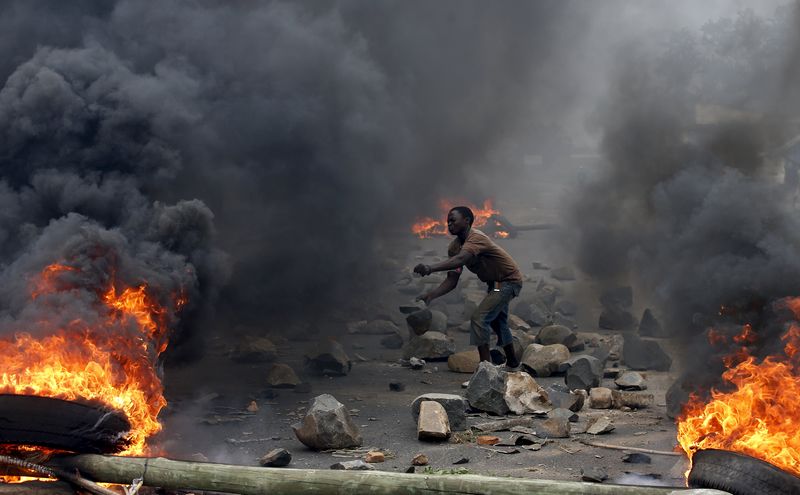By Goran Tomasevic
BUJUMBURA (Reuters) - As darkness falls, vigilantes armed with automatic rifles emerge to patrol the streets of Bujumbura, a city plagued by killings and violence as Burundi's crisis deepens.
For months, the trill of cicadas in the tropical night has been interrupted by sporadic gunfire and explosions across the capital, centre of the turmoil sparked by President Pierre Nkurunziza's bid for a third term in office.
Thousands initially protested against the president and opposed his re-election in a disputed July vote. Now some have formed vigilante units, coming out at night in tracksuits and jeans, clutching AK-47 rifles as they patrol.
"If the police shoot at us, then, yes, we will fight back," the leader of one group, giving his name only as Fred, told this Reuters photographer, who followed his unit last week. "All hotspot neighbourhoods are protecting themselves in this manner."
Residents and vigilantes in other districts confirmed this.
It is the first time a foreign journalist has been allowed to follow such a group, securing images from Bujumbura that will stoke international worries about a new conflict erupting in a nation where an ethnically charged civil war ended just a decade ago after 300,000 people were killed.
The region remains haunted by the 1994 genocide in next-door Rwanda, in which 800,000 people, mostly members of the Tutsi minority and moderates among majority Hutus, were massacred.
Western powers say it must not be repeated in Burundi, which has the same ethnic mix. More than 200 people have been killed in violence since April, although rivalries have tended to run along political rather than ethnic lines so far.
Burundi's government, which dismisses suggestions of a new war, has described its armed opponents as "terrorists", while police say some "armed criminals" come out at night.
In the latest violence, at least four people were killed in Bujumbura at the weekend. Protesters in one district denounced Nkurunziza's third term, although a court had ruled before his re-election that he could serve five more years.
Vigilante leader Fred said he and his men had taken part in anti-government protests that erupted in April but they formed patrols in their area when police began to hunt them down.
"I can't say that this is a rebel movement, and no one is claiming that," he said, dressed in a Ralph Lauren shirt and pulling a white baseball cap over his eyes to mask his face as he spoke to a Reuters camera.
DISINTEGRATING SECURITY
"Since the government has been killing people, we decided to come up with this initiative to protect ourselves," Fred said, flanked by half a dozen young men with rifles, some with balaclavas and others with improvised masks.
Top government officials have been assassinated, while the bodies of opposition figures have also been found on the street. The government denies any extra-judicial killings.
The emergence of organised armed groups highlights disintegrating security in the capital and shows a marked change from the impromptu barricades of stones and tree trunks set up to bar access into residential districts early in the crisis.
At the start the nightly sortie, dozens of young men - about 20 of them carrying guns - lined up in military style on the street. When addressed by Fred and other commanders, they pumped fists in the air in salute. Then they split up.One unit paced through streets a few hundred metres from a police checkpoint, made of barbed wire strung across the road. There was no confrontation during the two hours or so while this journalist walked with them.
The presidential offices lay less than 2 km away.
A presidential spokesman said it was up to the police to comment on any such vigilante groups, if they existed. Asked how the government would deal with those carrying illegal arms, he said the president had been "crystal clear".
Earlier this month, the president set a Nov. 7 deadline for illegal arms to be handed over and said those who did not do so would be considered "enemies".
"It's only the police who patrol night and day," deputy police spokesman Moïse Nkurunziza told Reuters. "We are aware of armed criminals who sometimes clash with the police on patrol, especially at night."
Residents say armed vigilante units are now present in several areas, notably places where anti-government protests erupted earlier this year. Some residents said they felt safer with the vigilantes at night than the police during the day.
"Not all of us are armed with firearms but those who don't have guns or grenades use machetes," said a 35-year-old member of a vigilante group in another district of Bujumbura.
"If the situation deteriorates and nothing is done politically, the population will continue getting arms."
World powers and regional states fear unrest in Burundi could escalate if left unchecked. The Security Council has asked U.N. chief Ban Ki-moon to prepare a report by the end of this month outlining options for boosting the U.N. presence.
(Additional reporting and writing by Edmund Blair; editing by Giles Elgood)
Which stock should you buy in your very next trade?
With valuations skyrocketing in 2024, many investors are uneasy putting more money into stocks. Unsure where to invest next? Get access to our proven portfolios and discover high-potential opportunities.
In 2024 alone, ProPicks AI identified 2 stocks that surged over 150%, 4 additional stocks that leaped over 30%, and 3 more that climbed over 25%. That's an impressive track record.
With portfolios tailored for Dow stocks, S&P stocks, Tech stocks, and Mid Cap stocks, you can explore various wealth-building strategies.
